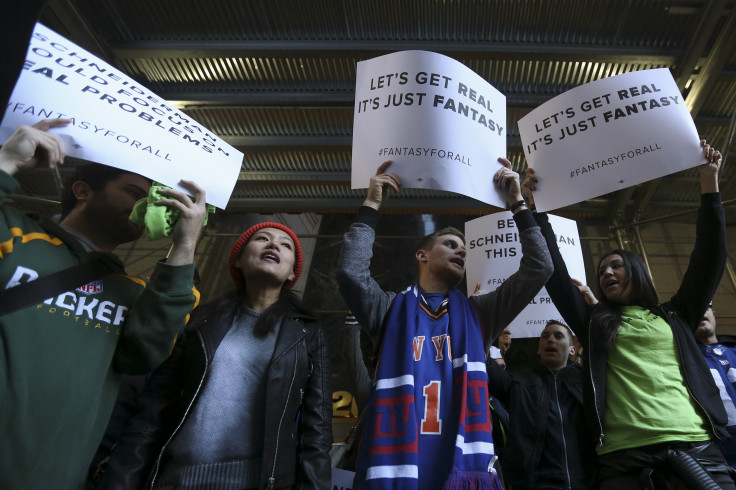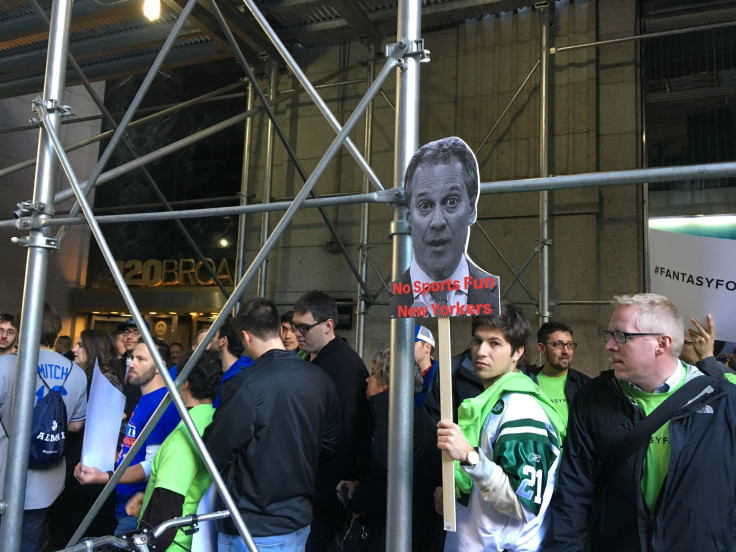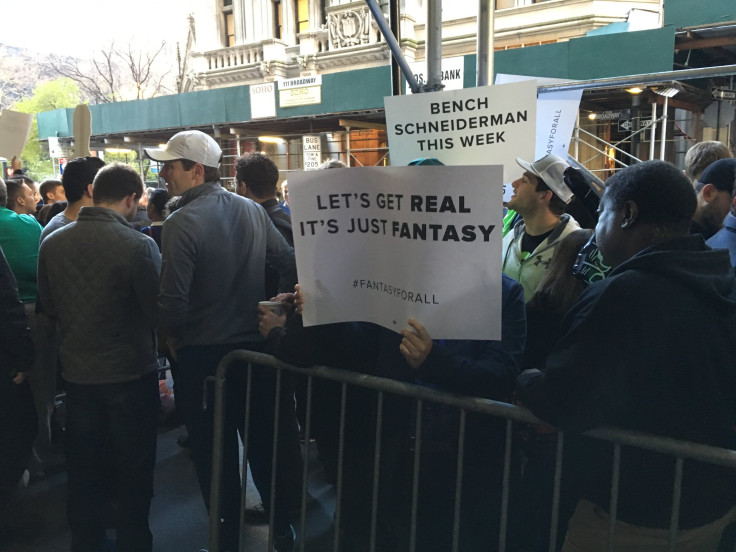DraftKings, FanDuel New York Legal Update: Daily Fantasy Services File Suits Against Attorney General, Stage Rally

Dressed in sports gear representing their favorite teams, dozens of fantasy sports supporters rallied outside New York Attorney General Eric Schneiderman's office Friday, waving signs and chanting slogans such as "Game of skill" and holding signs that read "Bench Schneiderman." The protest came days after Schneiderman called the services "illegal gambling" and ordered them to stop accepting "wagers."
The rally, which had been organized by a group of fantasy companies, was just one event in a day of defensive moves from the daily fantasy industry. Both FanDuel and DraftKings announced lawsuits in the New York State Supreme Court Friday that would attempt to block Schneiderman's threat to ban daily fantasy in the state, which is home to a significant population of daily fantasy customers. The embattled daily fantasy industry has come under recent intense scrutiny amid a growing national conversation surrounding the nature of their services, and on Friday both DraftKings and FanDuel took significant steps toward defending their businesses in both the courts and the court of public opinion.

A Necessary Step
DraftKings and FanDuel are the two biggest daily fantasy players, with each company valued at more than $1 billion and backed by hundreds of millions in private investments. The operators have argued their games are skill-based and not gambling, but a growing number of federal and state officials have begun to inquire into the industry's legality following a unintentional customer data leak last month from a DraftKings employee who later won some $350,000 in a FanDuel NFL contest.
Shortly after Friday morning's rally ended, news surfaced that FanDuel intended to file a lawsuit blocking the New York attorney general's ban. DraftKings followed soon after. "Today, we have taken decisive legal action to prevent a unilateral, misinformed and legally misguided attempt by the New York attorney general to act as 'judge, jury and executioner' for daily fantasy sports in New York," DraftKings said in a statement. "We are asking the New York Supreme Court to rule that the attorney general’s cease-and-desist letter is unconstitutional, an abuse of discretion, and simply wrong."
The challenge from the New York attorney general is the strongest rebuke yet of the daily fantasy industry. It's especially significant because New York accounts for 7 percent DraftKings customers and 5 percent of FanDuel customers, according to the lawsuits, Bloomberg reported.
#DFS lawsuits say NY represents 7% of @DraftKings customers and 5% of @FanDuel customers #sportsbiz
— Scott Soshnick (@soshnick) November 13, 2015Schneiderman doubled down Friday on his assertions that daily fantasy, in which participants pay entry fees to enter contests, in fact constitutes gambling. “The attorney general's job is to enforce New York State law, and the law here is clear. Online sports gambling sites are illegal in New York," Schneiderman's office said in a statement. "DraftKings and FanDuel are operating illegal sports betting websites under New York law, causing the same kinds of social and economic harms as other forms of illegal gambling."
In the face of the threat of a ban from Schneiderman, the lawsuits filed by DraftKings and FanDuel are likely necessary steps for the operators. “[DraftKings and FanDuel] would like to continue operating in the state of New York without the risk of criminal liability," said Marc Edelman, a law professor and sports business expert at Baruch College in New York City. The key is the operators would need to prove daily fantasy "contests do not involve material elements of chance," Edelman said.
But where the suits go is hard to predict. There is a lack of a "direct analog" or comparable case, said Chris Grove, a daily fantasy sports analyst and editor of LegalSportsReport.com. Grove, who said the substantial New York market likely accounts for some 10 percent of revenues for DraftKings and FanDuel, said any court decision likely would not find a compromise ruling that appeased both the attorney general and the daily fantasy operators.
"It is an all or nothing kind of case, it seems that way at this point I'm not sure what the middle ground would be," he said. Lawmakers across the country -- with a handful of states having elements of gambling law that echo New York's laws -- could look to the state as a model in approaching the industry moving forward. It's an important battleground for opponents and operators alike.
"There's a vacuum right now in terms of the proper way to handle this," Grove said.

Rallying The Public
While the lawsuits from FanDuel and DraftKings deal with the actual courts, the rally early Friday morning appeared aimed at the court of public opinion. It was organized formally by Fantasy Sports for All, a group of daily fantasy companies including FanDuel and Draft Kings. FanDuel promoted the event on Facebook and Twitter, and DraftKings tweeted about the rally while linking to the event page. FanDuel and DraftKings did not immediately respond to a request for comment Friday.
It's time to rally! Join us and protect #FantasyForAll! https://t.co/GRccVZjA38 pic.twitter.com/kRctuye5bj
— DraftKings (@DraftKings) November 13, 2015The rally, which drew significant media attention from local and national outlets, ginned up interest in daily fantasy just before the lawsuits were announced. A number of the attendees at the rally declined official comment, noting they were employees of daily fantasy operators. Fortune's Daniel Roberts estimated on Twitter some 75 percent of rally-goers were daily fantasy employees or media.
To the #DFS folks trying to dispute my estimate that 75% of rally was media or #DFS employees-- you're in denial. it was prob even more.
— Daniel Roberts (@readDanwrite) November 13, 2015
But some in attendance were indeed concerned daily fantasy users. Psychologist Stephen Bennette, who has played daily fantasy a couple of years, wasn't sure if he would classify the games as gambling but wanted to support the industry nonetheless.
"If I choose to spend my $10 a week [playing daily fantasy] instead of buying a lottery ticket ... shouldn't I have that right?" he asked.
The rally was able to attract at least one participant who didn't plan on attending, drawing in Allen de la Renta, 24, after he bought his morning coffee at a Starbucks across the street. The research analyst has played daily fantasy for about 18 months and said he felt the attorney general was "misinformed" and that the situation "was blown out of proportion."
The rally, which appeared to be attended by a few hundred people at its peak, lasted less than two hours, but was still "an effective exclamation point" of an overall smart strategy, said Jonathan L. Bernstein, president of Bernstein Crisis Management Inc. in California.
"I don’t think any single rally makes a difference. If they successfully get dozens of rallies going [it could make a difference]," he said. Bernstein also said statements from FanDuel and DraftKings followed the playbook he would have followed as a 30-year veteran of crisis management.
"They're coming out as confident and competent and passionate about the core of their customers," he said. And if you can draw customers to your side, such as de la Renta, it can go a long way to shifting perceptions.
"At the end of the day [Schneiderman is] an elected official and elected officials listen to voter counts," Bernstein said.
© Copyright IBTimes 2024. All rights reserved.






















